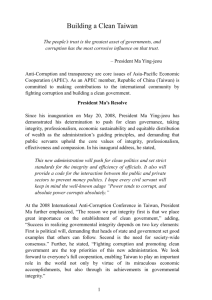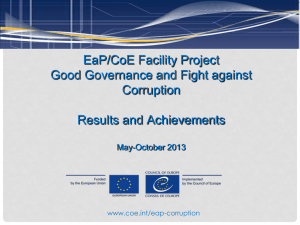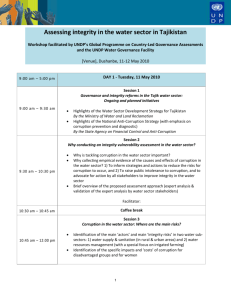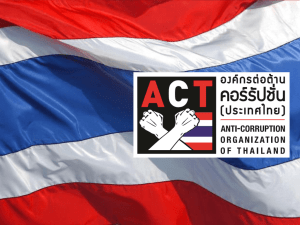Palestinian Central Bureau of Statistics (PCBS)
advertisement
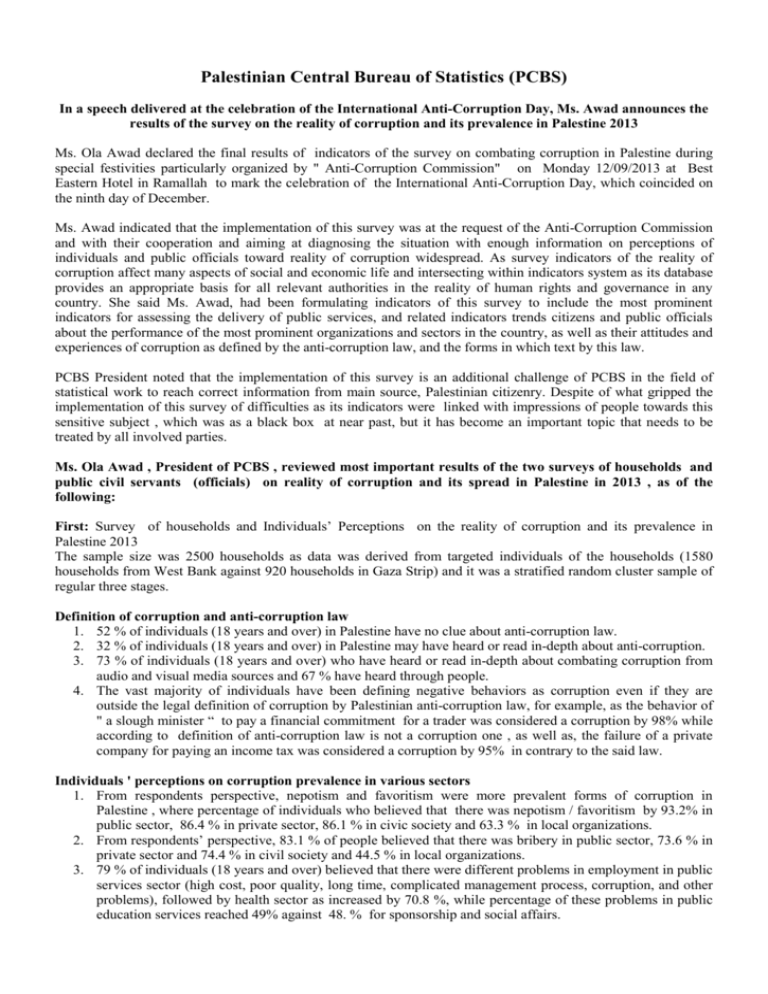
Palestinian Central Bureau of Statistics (PCBS) In a speech delivered at the celebration of the International Anti-Corruption Day, Ms. Awad announces the results of the survey on the reality of corruption and its prevalence in Palestine 2013 Ms. Ola Awad declared the final results of indicators of the survey on combating corruption in Palestine during special festivities particularly organized by " Anti-Corruption Commission" on Monday 12/09/2013 at Best Eastern Hotel in Ramallah to mark the celebration of the International Anti-Corruption Day, which coincided on the ninth day of December. Ms. Awad indicated that the implementation of this survey was at the request of the Anti-Corruption Commission and with their cooperation and aiming at diagnosing the situation with enough information on perceptions of individuals and public officials toward reality of corruption widespread. As survey indicators of the reality of corruption affect many aspects of social and economic life and intersecting within indicators system as its database provides an appropriate basis for all relevant authorities in the reality of human rights and governance in any country. She said Ms. Awad, had been formulating indicators of this survey to include the most prominent indicators for assessing the delivery of public services, and related indicators trends citizens and public officials about the performance of the most prominent organizations and sectors in the country, as well as their attitudes and experiences of corruption as defined by the anti-corruption law, and the forms in which text by this law. PCBS President noted that the implementation of this survey is an additional challenge of PCBS in the field of statistical work to reach correct information from main source, Palestinian citizenry. Despite of what gripped the implementation of this survey of difficulties as its indicators were linked with impressions of people towards this sensitive subject , which was as a black box at near past, but it has become an important topic that needs to be treated by all involved parties. Ms. Ola Awad , President of PCBS , reviewed most important results of the two surveys of households and public civil servants (officials) on reality of corruption and its spread in Palestine in 2013 , as of the following: First: Survey of households and Individuals’ Perceptions on the reality of corruption and its prevalence in Palestine 2013 The sample size was 2500 households as data was derived from targeted individuals of the households (1580 households from West Bank against 920 households in Gaza Strip) and it was a stratified random cluster sample of regular three stages. Definition of corruption and anti-corruption law 1. 52 % of individuals (18 years and over) in Palestine have no clue about anti-corruption law. 2. 32 % of individuals (18 years and over) in Palestine may have heard or read in-depth about anti-corruption. 3. 73 % of individuals (18 years and over) who have heard or read in-depth about combating corruption from audio and visual media sources and 67 % have heard through people. 4. The vast majority of individuals have been defining negative behaviors as corruption even if they are outside the legal definition of corruption by Palestinian anti-corruption law, for example, as the behavior of " a slough minister “ to pay a financial commitment for a trader was considered a corruption by 98% while according to definition of anti-corruption law is not a corruption one , as well as, the failure of a private company for paying an income tax was considered a corruption by 95% in contrary to the said law. Individuals ' perceptions on corruption prevalence in various sectors 1. From respondents perspective, nepotism and favoritism were more prevalent forms of corruption in Palestine , where percentage of individuals who believed that there was nepotism / favoritism by 93.2% in public sector, 86.4 % in private sector, 86.1 % in civic society and 63.3 % in local organizations. 2. From respondents’ perspective, 83.1 % of people believed that there was bribery in public sector, 73.6 % in private sector and 74.4 % in civil society and 44.5 % in local organizations. 3. 79 % of individuals (18 years and over) believed that there were different problems in employment in public services sector (high cost, poor quality, long time, complicated management process, corruption, and other problems), followed by health sector as increased by 70.8 %, while percentage of these problems in public education services reached 49% against 48. % for sponsorship and social affairs. Personal experiences and exposure of corruption and reporting 1. There is a clear gap between perceptions of individuals and their personal experiences about prevalence of nepotism, where 93% of individuals believed there was moody in public sector, while 3% actually used nepotism. 2. There were differences in using nepotism by service recipients and a percentage of 0.10 % of the recipients of public health services and the moody used during the past year, while nepotism was used by 23 % of the recipients of employment services. 3. About an individual out of every five people in Palestine reported that they had been subjected to an act of corruption or were witnesses during the past two years. 4. The percentage of individuals (18 years and older) who have reported an incident of corruption reached 22.6 % of all individuals who have been exposed to an incident of corruption during the past two years. Actors in combating corruption The police authorities were more effective in combating corruption from the perspective of the respondents , as reported by 86.4 % of individuals (18 + years ) , followed by security services by 84.0 % , and then Anti-Corruption Commission by 66.1% Second: a survey of public civil servants on reality of corruption and prevalence. The total sample size was 800 public civil servants, a supervisory position (Head of division and above) in the ministries in Palestinian West Bank. Definition of corruption and anti-corruption law 1. About 91 % of public civil servants in West Bank have no knowledge of anti-corruption law, 97% for those with civil servants with grades A1-A, 93 % of the directors of the degree of C to B, and 89 % of the heads of divisions. 2. About 31 % of public civil servants in West Bank have heard or read in depth on the subject of anticorruption. 3. About three -quarters of public civil servants in West Bank who have heard or read in depth on the subject of anti-corruption as their source was various mass media ( visual , audio , written ) , and about 56 % had heard from a source through people. Perceptions of public civil servants about prevalence of corruption in various sectors 1. From the standpoint of public civil servants in West Bank , nepotism and favoritism were more prevalent forms of corruption , where the percentage of public civil servants who believed that there was nepotism / favoritism reached 87.5 % in the public sector , 80.2 % in private sector , 81.5 % in civil society and 51.1 % in local organizations. 2. From the standpoint of public civil servants in West Bank, 67.3 % of public civil servants believe there was bribery in both the public sector and civil society against 64.5 % in private sector and 32.3% in local organizations. Personnel Management 64 % of public officials agree that personnel decisions during the last two years in their organization has a transparent manner, and 59 % approved that appointments were subject to external audit on regular basis, either with regard to the appointments about 11 % of the public civil servants noted that they were based on bribery during the past two years, while about 37 % of them indicated that they were based on nepotism and favoritism. Management of public funds About two-thirds of public civil servants agreed that decisions made within their organizations with regard to budget management were transparent. Regarding the percentage of public civil servants affected by decisions about the budget by favoritism and nepotism reached 19.0 %. There are 6.5 % of public civil servants agreed that the budget decisions within their organizations were affected by bribery. Contracting and bidding 1. About a third of public civil servants did not know about process of exceptions in solicitation. 2. 4.5%of public civil servants ( heads of divisions ) believe that there were exceptions in terms of solicitations of bids in their organizations , and this percentage was about 7 % for the directors of departments and only 2% among directors of Grade A or higher. Personal experiences and exposure to corruption and reporting 1. Percentage of public civil servants in West Bank who have been subjected to an incident of corruption during the past two years amounted to 17.8.% 2. Percentage of public civil servants in West Bank who have reported an incident of corruption reached 45.5% of the total of public civil servants who have been exposed to an incident of corruption during the past two years. 3. The concerned institution of acts of corruption perpetrators was highlighted as whistleblower resort to report corruption to at a percentage of 53.5% of public civil servants who have reported corruption incidents, followed by anti-corruption commission by 28.0%. Effective Bodies in combating against corruption Anti-Corruption Commission is one of most effective agencies in combating against corruption from public officials standpoint as reported by 83.7 %, followed by 70.7 % among police. Mrs. Awad also expressed her hope that PCBS has been successful in bridging an additional data gap and contributed to the provision of basic references to the Palestinian official statistics to serve the development process and decision-makers in various positions for formulation of decisions and plans on scientific professional basis.
